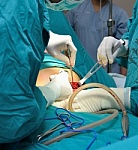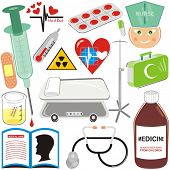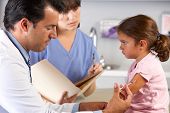Medication safety tips for children and adults – All medicines, when used in excess, or in incompatible combinations, or with any prohibited physical activity, may lead to life-threatening situations. Sometimes an out-of-date medicine may do harm rather than good. Since many bottles look alike, so do read the labels before using any medicine.
Important medication safety tips for all !
Vitamins for children are often sugar-coated. Children may take a large dose assuming them to be candy. This can be very dangerous. Keep all medicines away from the reach of children. This is the foremost medication safety tip for children.
Fancy coloured pills and medicine containers attract children right from the time they begin to crawl. Keep all such items out of their reach. Do not drink medicine directly from the bottle since you may ingest more than required.
A thermometer is a useful aid in the diagnosis of fever and to follow its course of treatment. It can, however, be catastrophic if it breaks in the mouth and the patient swallows some of the mercury.
Hence, when using it with children or with a patient who is sleepy or prone to epileptic attacks or violent temper, one should be very careful and vigilant.
In case of accidental swallowing of the mercury, the patient needs an emergency stomach wash in a hospital and no time should be lost in contacting a doctor.
The medicine cabinet should be cleaned once a year. Destroy and drain away all old, expired medicines as well as those that are no longer needed.
There are several medicines that come in squeeze tubes like toothpaste. Do not keep medicine and toothpaste in the same place, lest the medicine be mistaken for the paste or vice-versa.
When you have guests visiting, be extra careful. They may leave their medicine on a table or in easily accessible handbag where children can get to them.
Inoculations and vaccinations should be done as advised by your doctor. If there are pets in the house, every one should be inoculated against their bites and scratches. Tetanus shot on a regular basis is very helpful.
Blood transfusion is a life-saving measure. With the spread of diseases like hepatitis and AIDS, thorough testing of blood that is to be transfused, is necessary.
Alternatively, one may donate one’s own blood over a period of one or two weeks prior to surgery and let that blood be used for transfusion.
Medication safety precautions must be taken seriously
Do not take any medicine without the advice of a physician, even if the same medicine has been used before. There are several reasons for this. It may not be a correct medicine for the current ailment and may be outdated.
Some medicines need testing before being administered, even if these have been used earlier. One may not know the exact dose, frequency and the number of days for which the medicine has to be administered. Sometimes, the dose has to be changed from the one previously given.
Sometimes, a few tests may be required during the course of the treatment. One may require another medicine to control the side effects of the first, or may need a supplementary medicine and/or vitamins.
Some medicines may have to be taken on an empty stomach while others may only be taken after food has been ingested. If the person is already on some other medication, then the possibility exists of adverse interaction with the new medicine.
Whether or not one may have fried and spicy food or milk, etc. with the medicine needs to be known too. Special or specific signs or reactions may need to be observed during the course of the treatment. At the onset of these, the physician may need to be consulted. Only a physician can advise on all the above points.
Important information about medicines
The doctor, the pharmacist, and all the literature that comes with the drugs provide a lot of information about the medicines one is taking.
Some of the things that one should know are:
- The reason for which the drug has been prescribed. In case this medicine is not available in the market, the alternative to be used.
- What specifically is it supposed to do and how quickly? The recommended dosage – the number of pills or teaspoons to be taken at a time and how often in a day, plus the number of days the medicine has to be taken.
- In case more than one medicine has been prescribed, how should they be spaced during the day and whether these should be taken together or with some time gap between them?
- Whether the medicine should be taken before or after the meals and how long before or after the meal? Should the tablet or powder be taken with water or milk or fruit juice or honey? What are the side effects, if any?
The other questions to be kept in mind with regards to medication safety are:
What other medicine, vitamins, etc. should be taken, or precautions exercised to minimize the side effects? What are the interactions with other medicines, vitamins, specialized foods that one might be taking?
The dietary restrictions to be observed in terms of eating sugar, fats, spicy foods, etc . What specific items should be taken, e.g. water, fruit, fruit juice, soup, etc.? What activities should one avoid such as driving, reading for long periods of time, sitting straight for a long time, etc.? Are short naps recommended?
Is there a tapering of medicine intake with time or a sudden stoppage at the end of the recommended period?
How should the medicine be stored – in a refrigerator, or in a cool dark place? Are there any special precautions that need to be taken for pregnant women, small children, very old people, or people with some other diseases?
Also is there any testing to be done prior to giving the medicine: sensitivity test for penicillin or sulfa drugs, for example? What steps should be taken if the tests prove that the medicine is not suitable? What alternative medicine should be taken in that case?
What tests, if any, should be done during the course of the treatment? Where should they be done? Under what conditions should the patient stop taking the medicine altogether and call the doctor?
Should any other step be taken immediately to ward off any harmful effect of the discontinued medicine? The patient and at least one more adult in the family should understand all these points and accordingly carry out the regimen of administering the medication.
If you are on a life support system at home, do have an alternate power supply (battery or generator) available. With medical and health care systems becoming more sophisticated, it is imperative that users understand each new equipment or medicine very thoroughly before starting to use it.
A constant dialogue between the patient (his family members) and the doctor on the one hand, and the doctor and drug company/equipment manufacturer(s) on the other, will prove beneficial to all.
RELATED TOPICS
Personal injury lawyers in Austin
Online medical assistant schools



